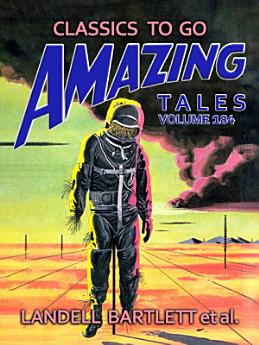Amazing Tales Volume 184
Landell Bartlett
Mar 2024 · Otbebookpublishing
Ebook
116
Pages
family_home
Eligible
info
reportRatings and reviews aren’t verified Learn More
About this ebook
Welcome to "Amazing Tales Volume 184", a captivating anthology that delves into the mysteries and marvels of human experience across time and space. This collection explores themes of reality versus fiction, the race against time, the haunting echoes of war, and the challenges of an overpopulated future. In "The Vanguard of Venus" by Landell Bartlett, a tragic accident leads to the discovery of a mysterious manuscript that blurs the line between reality and fiction. As executors debate its authenticity, the narrative unfolds into a gripping tale of cosmic intrigue and the double life of an unassuming bachelor. This story invites readers to ponder the very nature of truth and the stories we choose to believe. Transitioning to the eerie and suspenseful "Question of Comfort" by Les Cole, we find ourselves in a deserted Disneyland where a man is in a desperate race against time. With only an hour left after taking his last yellow pill, he must locate a hidden monster within the park's Tour building. This tense narrative explores themes of urgency and the thin veil between safety and danger. Next, "Divvy Up" by Stephen Marlowe transports us to a gritty post-war world where cruelty is commonplace, and inhumanity prevails. As Hardesty faces the firing squad, the story captures the chilling normalization of violence in society. Marlowe's tale challenges readers to reflect on the depths of human cruelty and resilience. Finally, "A Jar of Jelly Beans" offers a glimpse into a future world in 2060, where Justin, a Nobel laureate, grapples with the consequences of an overcrowded planet. The looming elections and the burden of humanity's past choices weigh heavily on him as he searches for a solution. This thought-provoking story asks us to consider the implications of our current actions on future generations. Each story in "Amazing Tales Volume 184" invites readers to explore the boundaries of possibility and the enduring strength of the human spirit.
About the author
Landell Bartlett, born in 1923 in the bustling city of Chicago, emerged as a pivotal figure in mid-20th century speculative fiction. A child of the Great Depression, Bartlett's early life was marked by economic hardship, which profoundly influenced his later works, imbuing them with themes of resilience and human ingenuity. Bartlett's literary career took off in the late 1940s, a period of rapid technological advancement and Cold War anxieties. His stories often explored the ethical implications of scientific progress, weaving intricate narratives that questioned humanity's readiness for the future it was hurtling towards. His groundbreaking short story, "The Iron Horizon," published in 1952, is credited with inspiring a generation of writers to delve deeper into the moral quandaries of technological innovation.A controversial figure, Bartlett was known for his outspoken views on censorship and freedom of expression. In the 1950s, he famously clashed with the House Un-American Activities Committee, staunchly defending the rights of writers to explore politically sensitive themes without fear of retribution. This defiance earned him both admirers and detractors, solidifying his reputation as a fearless advocate for artistic freedom.Bartlett's influence extended beyond his writing. He mentored several young authors who would go on to become luminaries in the science fiction genre, including Ursula K. Le Guin and Philip K. Dick. His emphasis on character-driven storytelling and ethical complexity helped shape the narrative techniques of contemporary speculative fiction.Landell Bartlett passed away in 1987, but his legacy endures. His works continue to be studied for their prescient insights and their unflinching examination of the human condition in an era of unprecedented change.
Rate this ebook
Tell us what you think.
Reading information
Smartphones and tablets
Install the Google Play Books app for Android and iPad/iPhone. It syncs automatically with your account and allows you to read online or offline wherever you are.
Laptops and computers
You can listen to audiobooks purchased on Google Play using your computer's web browser.
eReaders and other devices
To read on e-ink devices like Kobo eReaders, you'll need to download a file and transfer it to your device. Follow the detailed Help Center instructions to transfer the files to supported eReaders.




